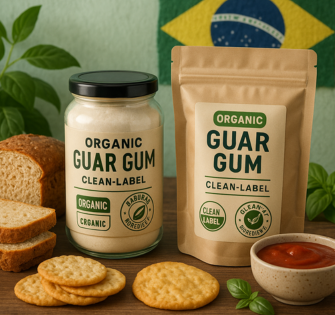Brazil’s Niche Market for Food-Grade Guar Gum in Organic and Clean-Label Foods
Brazil’s food industry is witnessing a growing trend towards organic and clean-label products, driven by increasing consumer awareness around health, wellness and ingredient transparency. Within this evolving market, food grade guar gum powder emerges as a vital natural binding agent widely adopted for its multifunctional properties.
The unique ability of guar gum to improve texture, stabilize emulsions and enhance viscosity positions it as an indispensable ingredient in organic and clean-label food formulations. This article highlights how Brazil’s niche market leverages food grade guar gum and guar gum split to meet the demands of discerning consumers while maintaining product integrity.
Understanding the Role of Guar Gum Powder in Organic and Clean-Label Foods
Food manufacturers in Brazil are increasingly turning to guar gum powder for its clean-label appeal. As a natural binding agent, guar gum satisfies both functional and marketing needs by providing viscosity and texture enhancement without synthetic additives.
Its versatility enables it to serve various purposes – thickening sauces, stabilizing beverages and improving the mouthfeel of dairy alternatives. The use of food grade guar gum aligns well with the organic food sector’s commitment to natural ingredients, allowing brands to create transparent formulations that consumers trust.
Moreover, guar gum’s effectiveness at low concentrations contributes to clean-label product formulations that remain simple and ingredient-friendly.

Brazil’s Organic Market Dynamics Driving Guar Gum Adoption
Brazil’s organic food market continues to expand, fueled by consumer preferences for natural, chemical-free and minimally processed products. This growth creates a favorable environment for ingredients that meet organic certification requirements and deliver functional benefits.
Guar gum suppliers offer high-quality powder that meets stringent purity standards, ensuring compatibility with organic production guidelines. The adoption of guar gum in products ranging from organic baked goods to dairy-free yogurts underscores its importance in this niche.
The emphasis on clean-label formulations in Brazil supports the increasing inclusion of guar gum as a trusted additive that bridges performance and natural ingredient demands.
Functional Advantages of Guar Gum Split in Brazilian Food Manufacturing
The use of guar gum – the refined endosperm – is prevalent among Brazilian food producers aiming for consistency and quality. It provides a concentrated source of galactomannan polysaccharides responsible for thickening and stabilizing effects.
Brazilian manufacturers deliver consistent food binding agent properties, critical for product texture and stability in organic jams, sauces and dairy alternatives. These splits enable better control over viscosity, gel formation and shelf-life extension, making them indispensable in organic and clean-label formulations.
Challenges and Opportunities in Brazil’s Guar Gum Market
While demand rises in Brazil, challenges such as sourcing consistent quality guar powder and maintaining supply continuity exist. However, these challenges create opportunities for manufacturers and suppliers to innovate and strengthen quality control measures.
Brazil’s food industry also benefits from ongoing research applications, exploring new ways to incorporate it into organic snacks, gluten-free bakery and plant-based beverages. The potential to replace synthetic stabilizers supports the industry’s move toward cleaner ingredient lists.
Future Outlook: Strengthening Brazil’s Position in the Global Organic Guar Gum Market
Brazil’s growing organic and clean-label food segment positions it as a strategic market. As consumer awareness around health and ingredient transparency deepens, food grade guar gum powder will likely see increased incorporation in innovative food products.
The continuous collaboration enhances product development, ensuring the functional and regulatory demands of Brazil’s organic food sector. This synergy fosters the growth of a robust guar gum market that contributes to Brazil’s standing in global organic ingredient supply.
Conclusion:
The niche market for food grade guar gum in Brazil’s organic and clean-label foods exemplifies how natural ingredients can drive product innovation and consumer trust. Guar gum’s role as a natural binding agent, stabilizer and thickener makes it a critical component in the formulation of transparent, healthy and effective food products.
By embracing high-quality powder, Brazil’s food manufacturers continue to meet rising demand for organic and clean-label foods, creating products that satisfy both regulatory standards and consumer expectations.

